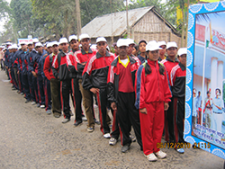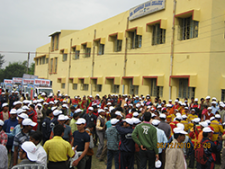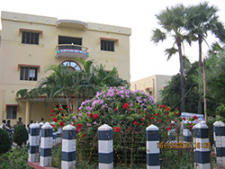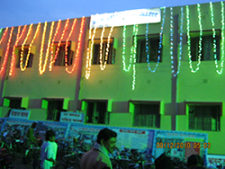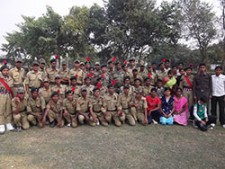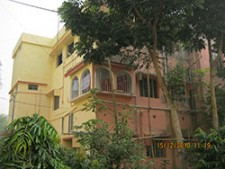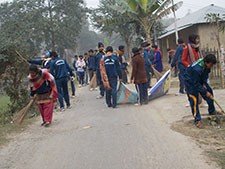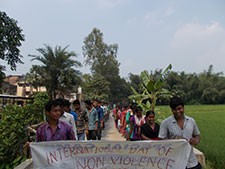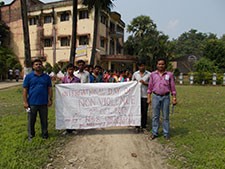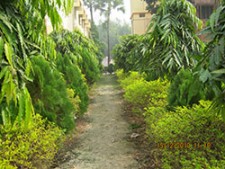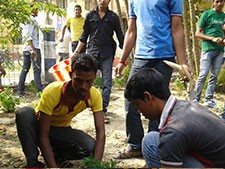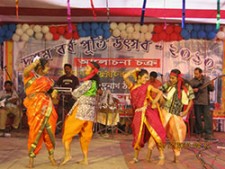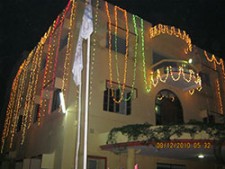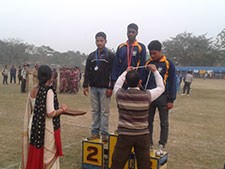Education
- Introduction
- Curriculum
- Teaching Learning
- Learning Resources
- E-Learning initiatives
- Seminar, Conferences, Webinar and Workshops
- Notices & Events
- Contact Information
The Dr. Meghnad Saha College has started its academic journey from 2000 at Itahar of Uttar Dinajpur district. The college is under the affiliation of UGC Act 2(f) & 12 (b). There are total eight Arts and three science department in the college. The department of Education has started its journey from 2010 with offering B.A General course in Education. Gradually increasing with the demand of the subject, the department of education also started offering B.A Honours in Education from 2012. Firstly department started running with three part time teacher and in 2017 one permanent assistant professor has joined and acting presently head of the department.
Vision and Mission:
- To impart quality education to the rural and economically weaker students.
- To raise the standard of our students to global levels and make them employable.
- To provide a platform to the students to exhibits their talents and creativity to the world of knowledge.
- To provide education not only to acquire knowledge but also to inculcate a sound philosophy for a holistic living.
-
-
- To encourage self evaluation, personality development and guide to the students to strive towards perfection and competence.
-
Objectives of the Honours program:
-
-
- To make the students more understandable about the different aspects and issues of education
- To develop a positive among students towards the teaching profession.
- To aware students about the current education system, structure and prospects in the modern days.
- To open the door of employment to the students.
-
Syllabus for the Honours program:
For 1+1+1 system: Syllabus
For CBCS system: Syllabus
Course Outcome of Honours Program:
SEM-I
DC-1(Philosophical Foundation of Education)
1. To develop understanding of the meaning, aims, objectives, and functions of education. 2. To develop an understanding of the roles of Philosophy in Education. 3. To develop understanding of major components in education and their interrelationship.
DC-2 (Sociological Foundation of Education) 1. To develop an understanding of the meaning of Sociology and Education. 2. Todevelopanunderstandingoftheprocessesofsocialchangeanditsimpacton education. 3. To become aware of social Groups and socialization that influence education. 4. To develop an understanding of the culture and its impact on education. 5. To examine the social problems in present society.
SEM-II
DC-3 (Psychological Foundation of Education)
1. To enable the student to understand the meaning and scope of educational psychology. 2. To enable to understand the dimensions of growth (e.g. social, emotional, creative and intellectual) and the causes of individual differences. 3. To develop understanding of the process of learning and problems of learning. 4. To acquaint them with the knowledge of Intelligence and Creativity. 5. To enable them to understand different aspects of personality and means of developing an integrated
DC-4 (Education in Ancient, Medieval and pre-independence India)
1. To be acquainted with the salient features of education in India in Ancient & Medieval times. 2. To be acquainted with the development of education in British India. 3. To be acquainted with the development of education in Independent India, including significant points of selected Education. 4. To have an adequate knowledge of the recommendations of various commissions and committees on Indian Education.
SEM-III
DC-5 (Education of India after independence)
1. To have an adequate knowledge of their commendations of various commissions and committees on Indian Education.
DC-6 (Approaches of Indian education)
1. To develop an understanding of significant trends in contemporary education. 2. To develop awareness of various organizations and their role in the implementation of policies and programs. 3. To focus attention on certain major national and social issues and role of education in relation to them
DC-7 (Contemporary issues in Indian education)
1. To understand the meaning and perspectives of women Education, 2. To understand the meaning and perspectives of Social Education, 3. To understand the meaning and perspectives of Environmental Education.
SEM-IV
DC-8 (Educational evaluation)
1. To develop understanding of the concepts of measurement and evaluation in the field of education. 2. To acquaint with different types of measuring instruments and their uses. 3. To acquaint with the principles of test construction– both educational and psychological. 4. To develop understanding of the concepts of validity and reliability and their importance in education measurement. 5. To develop the ability to organize and to use various statistical measuring analysis and interpretation of relevant educational data
DC-9 (Statistics in Education)
To develop the ability to represent educational data through graphs and to develop skill in analyzing different descriptive measures.
DC-10 (Educational Management)
1. To develop knowledge and understanding of the meaning, scope process and types of management. 2. To develop the ability to identify the roles of participating members (individual or collective) and to plan various institutionalized managerial activities. 3. To develop the ability of making objective decisions in educational management.
SEM-V
DC-11 (Educational Technology)
1. To enable the students to understand about the concept, nature and scope of educational technology. 2. To expose the students to the basic developments in Educational Technology.
DC-12 (Educational Guidance and Counselling)
1. To help in understanding the meaning and importance of guidance and counseling. 2. To develop the ability to interpret various records for assessing the student’s strengths and weaknesses. 3. To understand the qualities of an ideal counselor. 4. To develop interest in one’s own personal and professional growth. 5. To understand the concept of mental health and processes of healthy adjustment and good interpersonal relationships.
DSE-1 (Inclusive Education)
1. To comprehend the basic characteristics of inclusive education. 2. To comprehend the needs of inclusive education in modern society. 3. To understand the basics related to design the platform of inclusive education.
DSE-2 (Mental Health)
1. To comprehend the meaning of mental health and mental hygiene. 2. To comprehend the meaning of mental illness and maladjustment.
SEC-1 (Pedagogy)
1. To initiate students to the field of pedagogy. 2. To familiarize the students with principles of teaching. 3. To develop an understanding of various methods of teaching 4. To develop an understanding of there of a modern teacher.
SEM-VI
DC-13 (Curriculum Construction)
1. To understand the meaning, concept and scope of curriculum. 2. To understand the basis of curriculum construction, transaction evaluation and innovation.
DC-14 (Educational Thought)
1. To develop an understanding of the thoughts of great educationists and their contributions in education. 2. To be acquainted with the process of collecting data. 3. To be acquainted with the process of reporting of the collected data.
DSE-3 (Teacher Education)
1. To enable the students to understand the meaning; scope, objectives of teacher education and its development in India. 2. To acquaint the students with different agencies of teacher education India and their roles and functions. 3. To acquaint the students with the various aspects of student-teaching programme, prevailing in the country. 4. To develop in the students an understanding about the important research findings in teacher-education.
| DSE-4 (Project Work)
1. To know meaning and basic characteristics of a different tests. 2. To understand the different psychological tests. SEC-2 (Testing) 1. To know the meaning and different characteristics of an achievement test. 2. To comprehend different functional aspects of standardization.
|
Syllabus of Generic Elective:
URL: Three Years Generic Elective syllabus
Generic Elective Course Outcome:
GE 1: Life Skill Education
-
-
- To enable the Students to understand different aspects of life skills
- Comprehend different types of life skills needs for better society
- Conceptualize social skills, thinking skills, coping skills
- Understand different approaches of positive psychology and its developmental aspects.
-
GE 2: Yoga Education
-
-
- To enable the Students to:
- correlate Yoga and Education;
- transact different determinants of Yoga Education and Yoga Practices;
- determine the scientific bases of yoga practices;
-
GE 3: Environmental Education
-
-
- To acquaint the students with the various aspects of Environment and Environmental Science.
- To develop in the students an understanding about Environmental Education and its importance.
- To make the students to comprehend various approaches of Environmental Education
-
GE 4: Basic of Research Methodology
-
-
-
- Describe the nature and process of research in education.
- Describe and differentiate the various methods of sampling.
- Describe and differentiate the various methods of Research.
-
-
Faculty Profile:
| RAJU SINGHA | 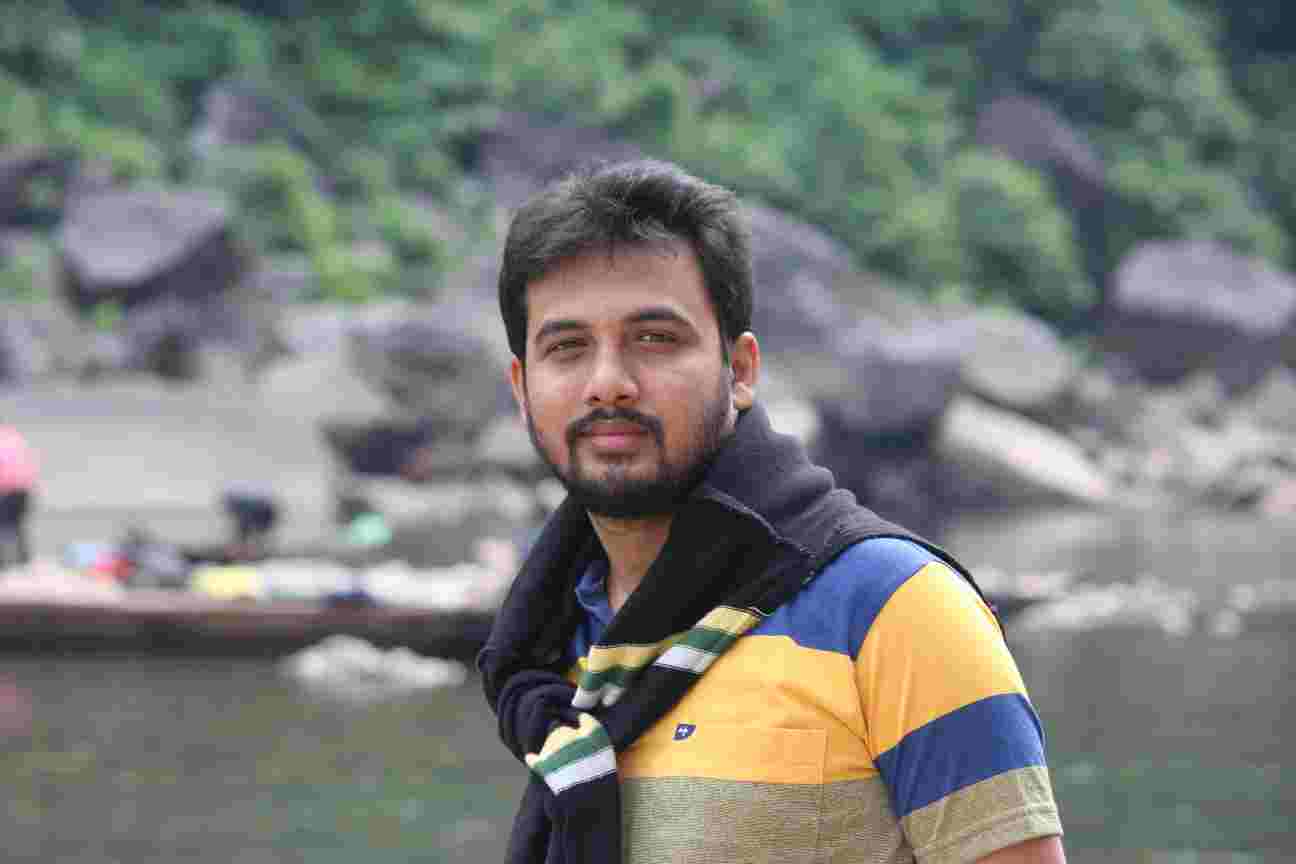 |
| ASSISTANT PROFESSOR & HOD | |
| M.A in Education | |

|
| GOPAL CHANDRA SEN | 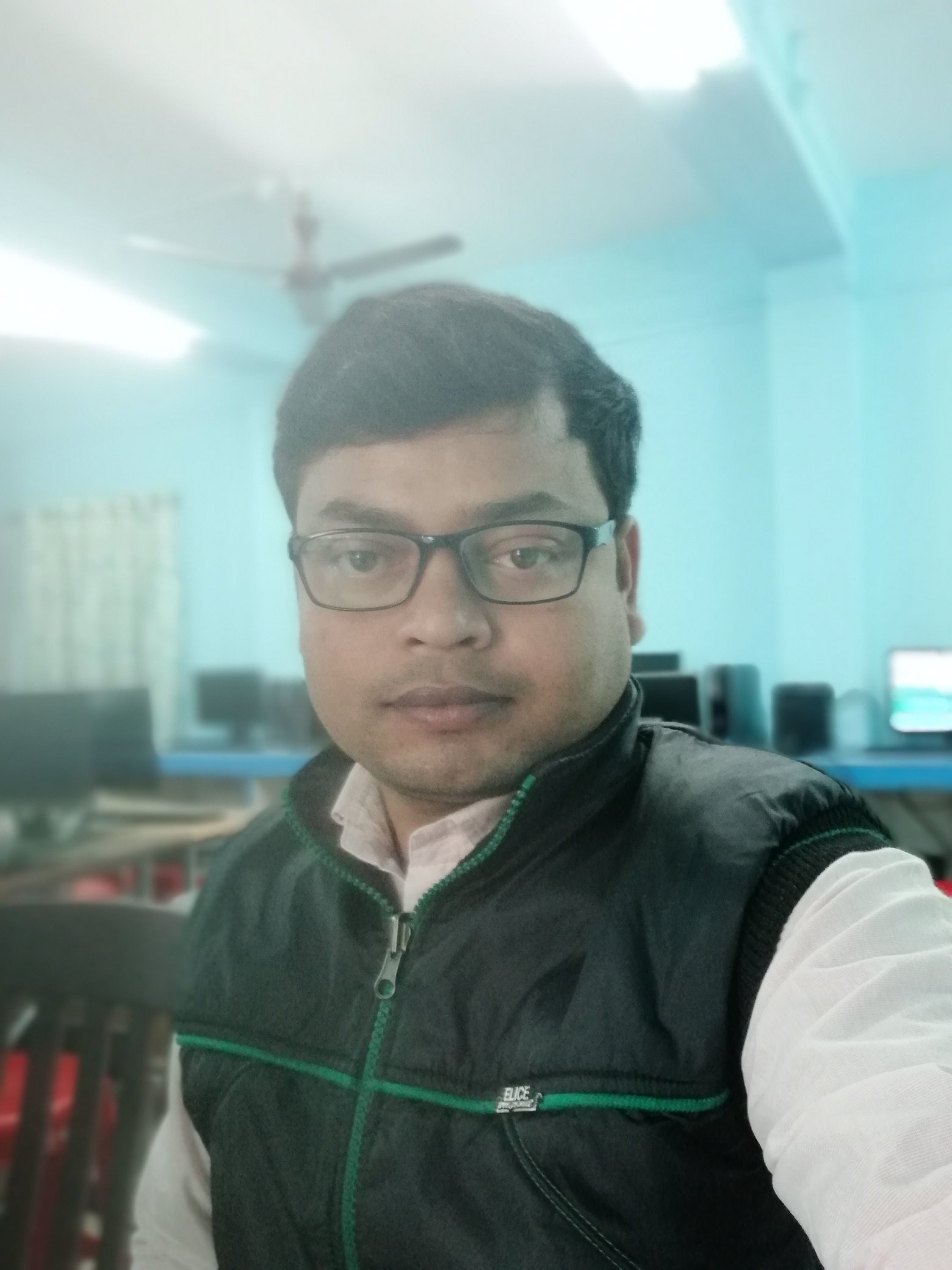 |
| SACT | |
| M.A. | |

|
| MONA DEBNATH | 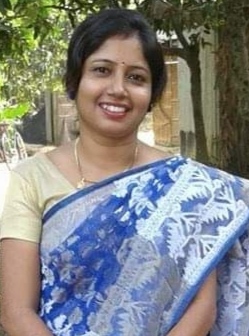 |
| SACT | |
| M.A. IN EDUCATION, B.ED | |

|
Students Intake and Enrolment of last five year:
Teaching Methodology
-
-
-
- Project work /Dissertation:
-
-
In every year department arrange an educational excursion with that students are motivated to do such field work related project work as prescriberd by the Gour banga University for Part-III honours students
-
-
-
- Internal assessment:
-
-
The department organizes regular internal assessment as per with the current CBCS syllabus in the form of formative evaluation techniques. This test is very helpful to the faculties to know the strength and weakness of the students.
-
-
-
- Group Discussion :
-
-
The department frequently arrange Group Discussion to enhance the social skills ,intellectual abilities, Reasoning skills among the students.
-
-
-
- Quiz :
-
-
Education department believes in joyful education. So the department always tries to teach the lesson in a different way like quiz, heuristic method, Brain storming etc.
-
-
-
- Remedial Teaching :
-
-
We believe in individual differences. It’s a fact if we found some students may be slow learner, For them department always tries to keep some remedial classes which is very helpful for them.
-
-
-
- The department has one dedicated traditional classroom with ICT enabled.
- The department has a departmental library (maximum of Bengali Books) and students can also uses the central library facility of the college.
- There is a dedicated web link of an online Portal, where faculty can upload the learning materials and they can easily access it.
-
-
-
-
-
-
- Faculties of the department use various online platforms for direct teaching, evaluation and resource sharing.
- Study materials also regularly uploaded in the college websites by the faculties of this department.
- N-LIST is extensively used by the faculty and the students of the department.
-
-
-
|
SL NO. |
Event |
Date |
Name of the resource Person’s |
Number of Participants |
Outcome |
|
1. |
National Webinar |
15.07.2020 |
1.Dr. Debabrata Debnath(Prof) 2. Dr. Pranab Barman(Asstt. Prof) 3. Mr. Ajith Kr. C (Asstt. Prof.) |
188 |
The importance of digital pedagogy |
|
2. |
Special Lecture |
17.04.2018 |
Dr. Shibranjan Mishra |
108 |
How we can overcome the crisis in education. |
Education Notice Date-2019.04.13
Education Notice Date-2019.01.29
Education Award list Date-2019.02.05
Education Notice Date-2019.01.03
Education Telephone No.:
Email: drmsc.education@gmail.com
WhatsApp Group Link
Semester-1: CLICK HERE
Semester-2: CLICK HERE
Part-2: CLICK HERE
Facebook Page: CLICK HERE



